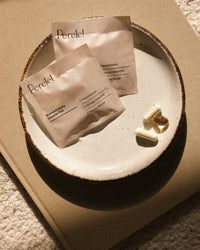Key Takeaways
- Your gut and vaginal microbiomes play a key role in fertility, working together to support hormone balance and reproductive health.
- Strains like Lactobacillus crispatus, L. rhamnosus GR-1, and Bifidobacterium longum are the most researched for supporting conception.
- Perelel’s doctor-formulated supplements make it easy to build a daily routine that supports your whole body before, during, and after pregnancy.
When you think about fertility, your mind probably goes straight to hormones, ovulation, and egg quality. But here’s the thing: your microbiome also plays a major role. The trillions of bacteria in your gut and vaginal tract quietly influence everything from hormone balance to how your body prepares for conception.
At Perelel, we believe fertility starts with the whole body. Supporting your digestion, immune health, and vaginal ecosystem helps create the environment your body needs to thrive. But with so many probiotic options out there, it can be hard to tell what actually supports fertility and what’s just clever marketing.
Read on to learn which probiotic strains are backed by science and how to fit them into your routine to help your body feel ready to conceive.
1. Lactobacillus crispatus
Think of Lactobacillus crispatus as the gatekeeper of your vaginal microbiome. It’s one of the most dominant and desirable strains found in healthy vaginal environments and plays a key role in keeping everything balanced.
This strain helps maintain a naturally low pH, which discourages the growth of unwanted bacteria. Research has also linked L. crispatus dominance to higher implantation and pregnancy success rates in fertility treatments.
Because it’s so sensitive, L. crispatus can be disrupted by common things like antibiotics, stress, or hormonal shifts. That’s why maintaining consistent probiotic support can help preserve its balance.
2. Lactobacillus rhamnosus (GR-1)
Lactobacillus rhamnosus GR-1 is one of the most researched strains for women’s health, particularly for the vaginal and urinary systems. It helps restore healthy flora after imbalance and supports the natural defense mechanisms of the vaginal tract.
Research suggests that keeping the vaginal microbiome stable with strains like L. rhamnosus may indirectly support conception by promoting an environment where healthy implantation is more likely. This strain is often paired with Lactobacillus reuteri RC-14, a companion strain that enhances its ability to maintain balance.
3. Bifidobacterium longum
Your gut and reproductive health are more connected than you might think. Bifidobacterium longum is a key player in maintaining a balanced gut microbiome, which can influence everything from how your body processes nutrients to how it metabolizes hormones.
A healthy gut supports healthy estrogen levels and nutrient absorption, two major factors in preparing the body for conception. B. longum also helps maintain digestive comfort and overall microbial balance, which can have a ripple effect across your entire system, including your vaginal health.
While it isn’t a “fertility strain” on its own, B. longum complements vaginal strains like Lactobacillus crispatus and Lactobacillus rhamnosus by promoting whole-body harmony. When your gut and vaginal microbiomes are in sync, your body is better supported for every stage of the fertility journey.
How To Read a Probiotic Label
You now know which strains matter most, but even the best probiotic isn’t helpful if you can’t tell what’s actually inside the bottle. Learning how to read a probiotic label is key to choosing one that truly supports your fertility goals.
Strain Specificity
Start with strain specificity. A good label lists the full name of each probiotic, not just the species. For example, Lactobacillus rhamnosus GR-1 tells you exactly which strain has been studied for vaginal health. A label that only says Lactobacillus rhamnosus or “proprietary blend” leaves you guessing.
CFU Count
Next, check the CFU count, which is the number of live bacteria per serving. For everyday support, look for around 10 billion CFU, which is the clinically studied dose for gut and vaginal balance. More isn’t always better. What matters is the right strain in the right amount.
Safety Testing
You’ll also want to see quality and safety testing clearly listed. Look for brands that are doctor-formulated, third-party tested, and made in FDA-registered facilities. These details tell you the product is held to high standards and is safe to use while trying to conceive or during pregnancy.
Clarity
And if the label still feels like alphabet soup? Stick with brands that clearly explain their ingredient choices and are transparent about formulation, like Perelel, where every product is developed by leading OB/GYNs with your reproductive health in mind.
Which Probiotic Is Best for Fertility?
There are plenty of probiotics out there promising better digestion, skin, or immunity, but when it comes to fertility, you need something more intentional. That's why Daily Probiotic is a best-in-class probiotic, meticulously informed by the latest women's health research.
It was designed by leading OB/GYNs and fertility experts to support your body where it matters most: your gut, your vaginal microbiome, and your immune health. Each daily dose delivers 10 billion CFU of targeted, research-backed strains that help maintain microbial balance and overall wellness.
What makes it special is how seamlessly it fits into your existing routine. You can take it before, during, or after pregnancy, and it pairs perfectly with any of our daily Perelel Packs for a complete, doctor-formulated supplement system. No guessing, no complicated stacks—just clean, effective support that evolves with you through every stage of your journey.
Frequently Asked Questions
Do I need to take probiotics forever?
Not necessarily. Think of probiotics as ongoing support rather than a lifetime prescription. You can take them consistently during your preconception journey, throughout pregnancy, and into postpartum to help maintain balance as your body changes. Once your system feels stable, your clinician can help you decide whether to keep them in your daily routine long-term.
Are there any strains to avoid?
It’s less about avoiding specific strains and more about choosing ones that actually belong in the gut or vaginal microbiome. Skip vague “proprietary blends” that don’t name strains or use bacteria not backed by research in women’s health. Stick to targeted, clinically studied options that are proven to support balance safely before, during, and after pregnancy.
Do I need to talk to my doctor first?
Yes, it’s always smart to loop in your doctor or OB/GYN, especially if you’re trying to conceive, pregnant, or taking other medications. They can help you confirm which supplements make sense for your individual health goals.
The good news: Perelel’s Daily Probiotic was formulated by OB/GYNs and fertility specialists, so you can bring it to your next appointment knowing it’s designed with your reproductive health in mind.
The Bottom Line
Your fertility journey isn’t just about timing or hormones. It’s about creating balance throughout your entire body. From your gut to your vaginal microbiome, every system plays a part in how supported, nourished, and ready you feel to conceive.
At Perelel, we’re here to make that whole-body support simpler. Every product we make (from our Daily Probiotic to our Conception Support Pack) is formulated by leading OB/GYNs, fertility specialists, and nutrition experts to meet your body where it is and help you feel your best through every stage of your hormonal journey.
Whether you’re just starting to think about trying or already planning your next step, we’ll help you build a supplement routine that actually fits your body, your goals, and your life. Take our quiz to find your personalized Perelel routine and discover what your body needs to feel supported today and through every stage ahead.
Sources:
Lactobacillus crispatus-dominated vaginal microbiome | PubMed
Effect of L. crispatus M247 Administration on Pregnancy Outcomes | PMC
Lacticaseibacillus rhamnosus GR-1 | ScienceDirect




















